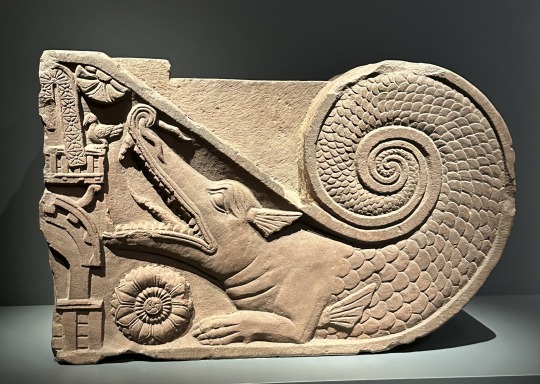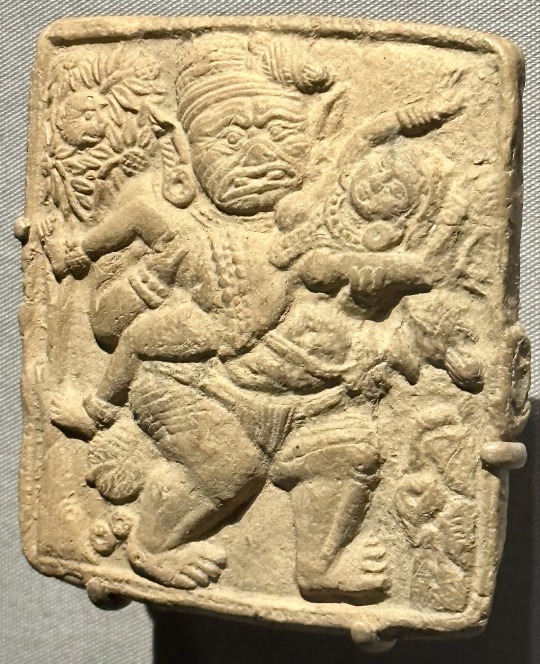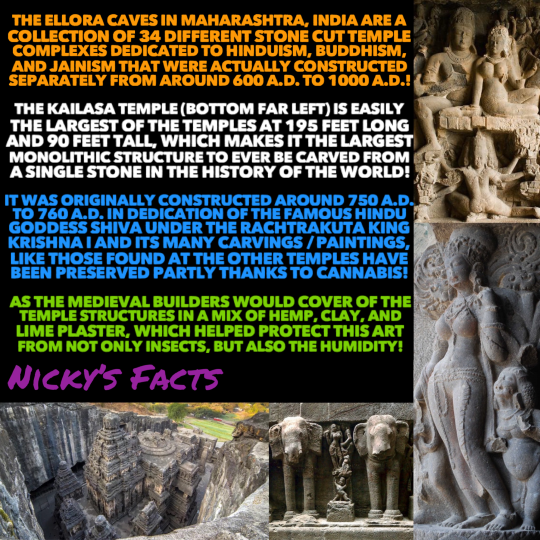#medieval indian history
Explore tagged Tumblr posts
Text

Wall paintings in Amer Fort in Rajasthan, India.
This is the main entranceway to the private areas of the fort, and it is entirely covered in beautiful wall paintings. It is called the Ganesh Pol due to an image of Ganesh painted directly above the doorway on the outside. Built during the reign of Mirza Raja Jai Singh (1621-67 AD), Amer fort was home to one of the most influential of the Rajput royal families during the time of the Great Mughals. The Mughal emperor Akbar's marriage to the Rajput princess Mariam-uz-Zamani, popularly known as Jodha Bai, places this court close to the heart of the history of the early Mughals, whose palace spaces were continually adapted by successive rulers.
Via Jordan Quill
#amer fort#rajasthan#india#south asia#south asian#architecture#indian architecture#wall painting#murals#rajput#mughal#medieval architecture#indian history#history#ots
55 notes
·
View notes
Text
Things I wanna see more emphasis on in ancient, medieval and early-modern Indian period dramas:
1. LESS ROYALTY AND BOURGEOISIE
2. ATHEISTS (positive representation)
3. Working class families and people
4. Marginalized groups (LGBTQ+, marginalized castes etc.) and outcasts.
5. LESS ROYALTY
6. Working class WOMEN who worked their asses off just like the working class men
7. Did I mention LESS ROYALTY and BOURGEOISIE?
8. ATHEISTS (positive representation)
9. Bar and restaurant scenes
10. Market scenes
11. NORTHEAST INDIA (and no, Bengal doesn't count) (Istg everything is just North and South-centric all the time)
12. TRIBAL PEOPLE
13. I feel like I haven't mentioned LESS ROYALTY AND BOURGEOISIE
14. Did I mention ATHEISTS (positive representation)?
#the list goes on#I'll add more when I remember#ancient india#medieval india#india#ancient culture#indian cinema#desiblr#desi tumblr#desi tag#indian movies#ancient history#period drama#period dramas
42 notes
·
View notes
Text
everyone who's a late roman republic or french revolution head needs to also hop on the late medieval early modern central and south asian train 😓😓im so alone (on tumblr that is)
#roman republic#late roman republic#frevblr#frev#french revolution#sorry for pranking you guys in the tags ❤️#we have gay persianate textile arts.. ooh ahh...#mughal empire#maratha confederacy#nayaka states#central asian history#south asian history#medieval persia#islamic history#persian miniature painting#indian miniature painting#history#some of you guys would love gayvestigating mughal politicians#go yaoify banarsidas NOW!
24 notes
·
View notes
Text

The decorated torana archway of Mukteshwar Temple, Odisha, India, 10th century. The temple dates back to 950–975 CE and is dedicated to Shiva. The stylistic development the Mukteswara marks the culmination of all earlier developments, and initiates a period of experiment which continues for an entire century, as seen in such temples as the Rajarani Temple and Lingaraj temple, both located in Bhubaneswar.
#india#indian history#indian architecture#indian art#ancient india#medieval india#medieval art#medieval history#middle ages#medieval architecture#hindu#hinduism
12 notes
·
View notes
Text










The Metropolitan Museum of Art
#art history#art#archaeology#academia#anthropology#renaissance#museum#medieval art#ancient#painting#sculpture#indian art#pompeii
30 notes
·
View notes
Text


Detail of The First Rains in Paradise, German manuscript c. 1410
Detail of Maharana Fateh Singh Crossing a River During the Monsoon, Shivalal c. 1893
#medieval manuscripts#indian art#art history#rain#I can only affirm that it looks good on mobile at this point
14 notes
·
View notes
Text
Art Museum Inspo
























#art#art museum#philadelphia#renaissance#armor#sculpture#knight#quran#india#asia#indian ar#asian art#medieval#paintings#georgia o'keeffe#edgar degas#andy warhol#ancient art#ancient history#pablo picasso
4 notes
·
View notes
Text
'Luxury Foods' in Medieval Islamic Societies by David Waines from World Archaeology, Vol. 34, No. 3, Luxury Foods (Feb., 2003)
"We may begin with the work entitled The Meadows of Gold written by the famous historian al-Mas'udi (d. AD 956). He was born in Baghdad and died in Cairo, having, in between, travelled widely in Persia and India in addition to Iraq, Palestine and Syria. The Meadows of Gold contains a number of anecdotes related to food. One involves the Abbasid Caliph, Harun al-Rashid (d. AD 809), of 1001 Arabian Nights fame. He was invited to dine by his brother Ibrahim b. al-Mahdi (d. AD 853), a noted poet and culinary expert, of whom more later.
Harun was served a dish of what appeared to be small and delicate slices of fish arranged in the shape of a fish. When informed that the dish was made from more than 150 fish tongues, the Caliph demanded to know its price and commanded that an equivalent of 1000 silver dirhams be distributed to the poor. This was in expiation, he said, for his brother's wastefulness. Moreover, he ordered a servant to take the fish on its plate, itself an expensive item worth five times as much as the fish preparation, and give it to the first beggar he met in the street.
A second anecdote involves another Caliph, al-Mutawakkil (d. AD 861), who was relaxing one day with his courtiers and singers beside one of the many canals that traversed Baghdad. He smelled the aroma of cooking drifting from a pot being prepared by a sailor on his boat. The Caliph ordered the pot - a beef sikbaj, a sweet and sour stew dish, brought immediately to him. The Caliph sampled the stew with a piece of bread, as did his courtiers and singers, until the pot was empty. He then ordered the pot filled with 2000 dirhams and returned to the boat; the coins that did not fit into the pot were placed in a pouch and given directly to the cook. In the Caliph's judgement the dish was the best sikbaj he had ever tasted."
I found this excerpt incredibly lovely and highly recommend you check out the whole thing on JSTOR (free to access when you make an account but also on scihub). Doing a short article review on it for my Global Connections module - covering Islamic history briefly has really touched me especially when I covered it quite begrudgingly as a child/pre-teen through Saturday-Sunday school. It was always a tug of war with my mother to make me go until at 16 I finally just refused outright and there was nothing she could do. Admittedly out of all the classes taught at the mosque Tahrikh and Seerah always engaged me. I'm glad I can revisit it with a warm heart and with no expectation to be something I'm not so I can love share and appreciate it with fresh eyes.
#palestine#palestinian history#arab history#history#medieval history#islamic history#islam#iran#iraq#india#syrian history#syria#iranian history#indian history#sikbaj#food history#culinary#culinary history#world trade#global trade#medieval trade#spice trade#pbuh#university#london#hospitality#islamic empire#jstor#history of food
11 notes
·
View notes
Text
6 notes
·
View notes
Text

You could say that the builders of these beautiful temples at the Ellora caves were huge stoners!😂
☸️🇮🇳🕉️
#history#ellora caves#maharashtra#kailasa temple#art#indian history#landmarks#medieval#architecture#stone#monolithic structure#hemp#medieval india#art history#travel girl#cannibus#shiva#hinduism#buddhism#jainism#beautiful#architectural history#india#wonder of the world#temples#medieval art#nickys facts
15 notes
·
View notes
Text

Detail from Squirrels in a plane tree attributed to Abu'l Hasan, ca. 1605-1608.
#abul'l hasan#art#art history#india#indian art#south asian art#mughal art#mughal#medieval art#paintings#south asia
51 notes
·
View notes
Text
This excerpt is from the journal left behind by Emperor Babur, founder of the Mughal Empire in India.
A figure from a point in history when matters related to homosexuality were looked down upon greatly; Babur had fallen in love with a boy he saw in the bazaar. Only two pages out of his journal pay attention to Baburi while all other prominent authors of that time choose to ignore his existence.

#history#books on tumblr#book blog#book#bibliophile#books & libraries#babur#mughal#indian#india#indian history#historical#medieval#homoseuxality#pride#lgbtqia#lgbtq community#lgbt pride#gay pride#lgbtq
6 notes
·
View notes
Text




anyway I heart medieval and early modern vijayanagar 🙏shoutout to the nayaka and I heart public works and diverse society
#art history#medieval art#medieval history#south Asian history#indian history#nayaka dynasties#nayaka#vijayanagar#vijayanagara history#deccan sultanates#deccan plateau
5 notes
·
View notes
Text
John richards the Mughal empire was decent but he didn't read any of the vernacular languages like ONLY court persian so there was like nothing about normal people or theology or visual art so that was a negative😭 also the economic stuff was SOOOO dry im afraid .. .still good but lowkey some inconsistencies were present .. made me want to read standalone books Abt the marathas and various nayaka like not in relationship to a crumbling imperial giant just what they were up to within their structures yk . Still informative .. I get very invested in wars of succession even though I don't ACTUALLY gaf . made me miss reading abt bhakti saints .. also want to read abt the intermediary period between muhammad shah and the british empire cuz I think intermediary periods are always the most interesting anyway . (Like archaic Greece yum)
#Mughal empire#mughal history#indian history#nayaka#rajputs#bhonsle dynasty#marathas#Cambridge new history of india#south asian history#medieval history#early modern history
0 notes
Text
Port Blair renamed as Sri Vijaya Puram
Context: Port Blair has been renamed ‘Sri Vijaya Puram�� by the Government of India in an effort to move beyond its colonial legacy. The new name pays tribute to the region’s historical ties with the Srivijaya Empire. This renaming also symbolizes the triumph of India’s freedom struggle, recognizing the unique and vital role the Andaman and Nicobar Islands played in that historic fight for…
0 notes
Text
What Was Life Really Like In America Before Columbus? | 1491 | Chronicle
youtube
#msvy chronicle#msvy chronicle - medieval history documentaries#msvy documentaries#msvy history#msvy native americans#msvy american indians#msvy native peoples#msvy indigenous people#msvy american history#msvy north america#msvy south america#msvy long video#good watch definitely worth the 3 hour time stamp#though i was playing minecraft with youtube down in the corner of my screen#so it wasn't exactly 100% of my attention for 3 hours#but that's adhd brain for you#probably will save this one and watch parts of it again sometime#Youtube
0 notes